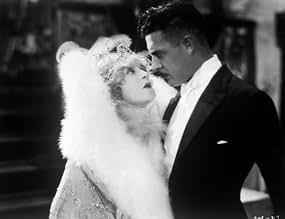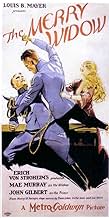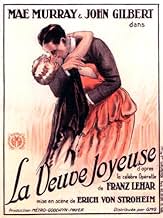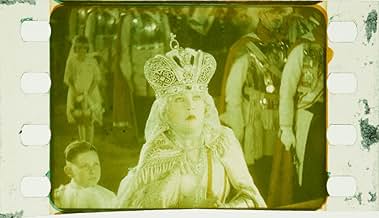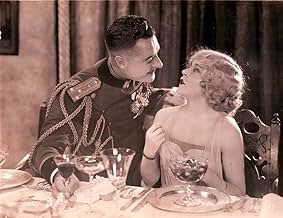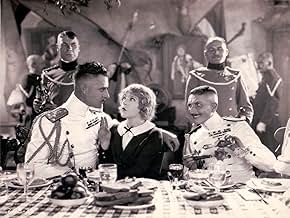CALIFICACIÓN DE IMDb
7.2/10
2.7 k
TU CALIFICACIÓN
Un príncipe debe cortejar a la ahora adinerada bailarina que una vez abandonó, para mantener su dinero en el país y evitar que éste se hunda económicamente.Un príncipe debe cortejar a la ahora adinerada bailarina que una vez abandonó, para mantener su dinero en el país y evitar que éste se hunda económicamente.Un príncipe debe cortejar a la ahora adinerada bailarina que una vez abandonó, para mantener su dinero en el país y evitar que éste se hunda económicamente.
- Dirección
- Guionistas
- Elenco
- Premios
- 3 premios ganados en total
Gertrude Bennett
- Hard-Boiled Virginia
- (sin créditos)
Bernard Berger
- Boy
- (sin créditos)
Sidney Bracey
- Danilo's Footman
- (sin créditos)
Estelle Clark
- French Barber
- (sin créditos)
Albert Conti
- Danilo's Adjutant
- (sin créditos)
D'Arcy Corrigan
- Horatio
- (sin créditos)
Joan Crawford
- Ballroom Dancer
- (sin créditos)
Xavier Cugat
- Orchestra Leader
- (sin créditos)
Anielka Elter
- Blindfolded Musician
- (sin créditos)
Dale Fuller
- Sadoja's Chambermaid
- (sin créditos)
Clark Gable
- Ballroom Dancer
- (sin créditos)
Opiniones destacadas
The Merry Widow was first seen by American audiences on Broadway during the 1907-08 season where it ran for 416 performances. For those of us who know it primarily from the sound films with first Maurice Chevalier and Jeanette MacDonald and later Fernando Lamas and Lana Turner, this version will be quite interesting. Let's just say that what was put in the talkies was a lot closer to the stage production. Erich Von Stroheim who directed this film added quite a bit to the story. In fact in the end it isn't quite so merry.
Most of the film is taken up with just how Mae Murray became The Merry Widow. She's an American dancer who is stranded in the remote Balkan kingdom of Monteblanco which is ruled by King George Fawcett. In line for the throne is the rakish Roy D'Arcy, a Snidely Whiplash villain if there ever was one. Behind him is his cousin John Gilbert playing Prince Danilo.
Murray comes to the attention of both men, Gilbert actually falls for her, D'Arcy would like an occasional roll in the hay, but marry her? There's a third guy out there in Tully Marshall who is the wealthiest man in the kingdom and it's principal banker. He leaves and the whole place goes into receivership. Marshall's an old dude with some alternative sexual interests that Von Stroheim exploits to the fullest on screen and he'd like a young trophy wife and Murray fills the bill.
She does become a wife ever so briefly and then of course the Merry Widow having had her fill of royalty. But now that she holds the Monteblanco purse strings, D'Arcy has taken a renewed interest in her and maybe she just might be a suitable queen.
I think you can see where this is going though Von Stroheim does tease us a bit with some possible alternatives before the film concludes. The audience of 1925 saw one lavish production that nearly broke the new Metro-Goldwyn studio. We only see about half the footage he shot if that.
One thing that Metro did not have to worry about was a soundtrack. The music of The Merry Widow was very familiar to the American public and it's played on the organ throughout the film. Young contract players Joan Crawford and Clark Gable are extras in the ballroom scene and good luck in spotting them. Although in the Citadel film series book on The Films Of Clark Gable there is a still from The Merry Widow where Gable is pointed out.
I'm sure John Gilbert little dreamed that in six years Gable would be supplanting him as the number one leading man at MGM. But in The Merry Widow he's a stalwart and resolute Danilo and Mae Murray actually does suggest a bit of what Jeanette MacDonald's performance would be in the first sound remake.
In the fate of what happens to D'Arcy's character, Von Stroheim opts for some realism in terms of the European scene of the past 25 years or so before the film debuted. In fact very little of the happy tone of The Merry Widow is preserved here. The film given how Murray got her millions ought to be retitled, The Trophy Widow.
Still it's an interesting alternative to the normal operetta productions we're used to seeing.
Most of the film is taken up with just how Mae Murray became The Merry Widow. She's an American dancer who is stranded in the remote Balkan kingdom of Monteblanco which is ruled by King George Fawcett. In line for the throne is the rakish Roy D'Arcy, a Snidely Whiplash villain if there ever was one. Behind him is his cousin John Gilbert playing Prince Danilo.
Murray comes to the attention of both men, Gilbert actually falls for her, D'Arcy would like an occasional roll in the hay, but marry her? There's a third guy out there in Tully Marshall who is the wealthiest man in the kingdom and it's principal banker. He leaves and the whole place goes into receivership. Marshall's an old dude with some alternative sexual interests that Von Stroheim exploits to the fullest on screen and he'd like a young trophy wife and Murray fills the bill.
She does become a wife ever so briefly and then of course the Merry Widow having had her fill of royalty. But now that she holds the Monteblanco purse strings, D'Arcy has taken a renewed interest in her and maybe she just might be a suitable queen.
I think you can see where this is going though Von Stroheim does tease us a bit with some possible alternatives before the film concludes. The audience of 1925 saw one lavish production that nearly broke the new Metro-Goldwyn studio. We only see about half the footage he shot if that.
One thing that Metro did not have to worry about was a soundtrack. The music of The Merry Widow was very familiar to the American public and it's played on the organ throughout the film. Young contract players Joan Crawford and Clark Gable are extras in the ballroom scene and good luck in spotting them. Although in the Citadel film series book on The Films Of Clark Gable there is a still from The Merry Widow where Gable is pointed out.
I'm sure John Gilbert little dreamed that in six years Gable would be supplanting him as the number one leading man at MGM. But in The Merry Widow he's a stalwart and resolute Danilo and Mae Murray actually does suggest a bit of what Jeanette MacDonald's performance would be in the first sound remake.
In the fate of what happens to D'Arcy's character, Von Stroheim opts for some realism in terms of the European scene of the past 25 years or so before the film debuted. In fact very little of the happy tone of The Merry Widow is preserved here. The film given how Murray got her millions ought to be retitled, The Trophy Widow.
Still it's an interesting alternative to the normal operetta productions we're used to seeing.
Stroheim's take on the familiar story is filled with his customary pomp and spectacle while never losing sight of the love story at its core. It's something of a slog at over two hours long though, and Gilbert's royal prince comes across as something of a sleaze at times. However, Roy D'Arcy makes a wonderfully hissable villain as the scheming Crown Prince Mirko (a role von Stroheim originally ear-marked for himself).
Erich von Stroheim has played a neat little trick with 'The Merry Widow'. The first half of the movie plays out like a quirky royal-romance comedy. There are plenty of scenes and gags that could belong to the best comedic works of Howard Hawks. In the second half, the tone changes into more melodramatic, yet the tonal change doesn't take the viewer out of the movie. It actually gives that perfect feel of a mental hangover after the pure love has been ripped into shreds by the cruel world. But the whole film has some sinister undertone - like something is about to happen, but you can't be sure, what it is. Von Stroheim constantly leads his viewers somewhere, allows them to guess, and then - BAM.
John Gilbert is likable as charming Prince Danilo. Mae Murray balances between hammy and sometimes very good performance (someone said, that von Stroheim made actress out from Murray). But Roy D'Arcy is hamming his Crown Prince Mirko up. In a good way. His portrayal of a monocle-wearing sleazy villain blows all previous Erich von Stroheim's performances out of the water.
Like any other von Stroheim's movie, 'The Merry Widow' also suffered from studio interference (some scenes that were cut were quite steamy, probably even for today's standards). I would want to say that 'The Merry Widow' is von Stroheim's weakest work, but again, we can't see his whole vision. The sets are beautiful. Camerawork and editing also something of their own league. Again, you have to admire von Stroheim's attention to small details - lecherous Baron Sadoja's obsession with women's legs, who himself has sick legs.
John Gilbert is likable as charming Prince Danilo. Mae Murray balances between hammy and sometimes very good performance (someone said, that von Stroheim made actress out from Murray). But Roy D'Arcy is hamming his Crown Prince Mirko up. In a good way. His portrayal of a monocle-wearing sleazy villain blows all previous Erich von Stroheim's performances out of the water.
Like any other von Stroheim's movie, 'The Merry Widow' also suffered from studio interference (some scenes that were cut were quite steamy, probably even for today's standards). I would want to say that 'The Merry Widow' is von Stroheim's weakest work, but again, we can't see his whole vision. The sets are beautiful. Camerawork and editing also something of their own league. Again, you have to admire von Stroheim's attention to small details - lecherous Baron Sadoja's obsession with women's legs, who himself has sick legs.
It may be a matter of taste but as much as I like and admire Erich Von Stroheim work before and behind the camera, his reputation as a `genius' doesn't seem justified by the films themselves.
Certainly Merry Widow is filmed with great style and the opulent design is certainly diverting. Also the decision to turn the story from light opera to fairly heavy drama is completely in keeping with Von Stroheim 's own rather cynical outlook. But I find his obsessive dwelling on details can make for a slow and even tedious viewing experience, especially in the first half which seems to spend an inordinate amount of time setting the relationship between the dashing, irreverent but humanist Prince Danilo Petrovich (Gilbert - in wonderful form) and the pompous, tight lipped and distinctly perverse Crown Prince Mirko (Roy D'Arcy).with scenes prolonged far longer than their dramatic weight justifies. Also where the film attempts a lighter tone, the effect is of a concrete soufflé, with every glance and double entendre painfully spelt out.
However this is still a satisfying film as a whole, especially in the second half where we finally have some DRAMA. Here in sequence after sequence we finally start to understand Von Stroheim's reputation as he examines the decaying Royal family under a particularly unflattering microscope. The tryst with the blindfolded musicians is a particularly memorable scene.
Having heard of Mae Murray's terrible treatment of the Von and others in her career, I had a tough time warming to her in this, but I have to admit she gives a great performance as Sally O ' Hara, an innocent who's mistreatment at the hands of the family almost ruins her life. Roy D'Arcy makes an indelible impression as the creepy Mirko, his every gesture filling one with disgust.
But for my money it's Gilbert's work that makes this film worthwhile. One of the very finest of silent actors, the expressiveness of his eyes, the tenderness of his playing and bearing throughout make his character completely convincing and his torment over loosing Sally a felt and poignant loss.
Certainly Merry Widow is filmed with great style and the opulent design is certainly diverting. Also the decision to turn the story from light opera to fairly heavy drama is completely in keeping with Von Stroheim 's own rather cynical outlook. But I find his obsessive dwelling on details can make for a slow and even tedious viewing experience, especially in the first half which seems to spend an inordinate amount of time setting the relationship between the dashing, irreverent but humanist Prince Danilo Petrovich (Gilbert - in wonderful form) and the pompous, tight lipped and distinctly perverse Crown Prince Mirko (Roy D'Arcy).with scenes prolonged far longer than their dramatic weight justifies. Also where the film attempts a lighter tone, the effect is of a concrete soufflé, with every glance and double entendre painfully spelt out.
However this is still a satisfying film as a whole, especially in the second half where we finally have some DRAMA. Here in sequence after sequence we finally start to understand Von Stroheim's reputation as he examines the decaying Royal family under a particularly unflattering microscope. The tryst with the blindfolded musicians is a particularly memorable scene.
Having heard of Mae Murray's terrible treatment of the Von and others in her career, I had a tough time warming to her in this, but I have to admit she gives a great performance as Sally O ' Hara, an innocent who's mistreatment at the hands of the family almost ruins her life. Roy D'Arcy makes an indelible impression as the creepy Mirko, his every gesture filling one with disgust.
But for my money it's Gilbert's work that makes this film worthwhile. One of the very finest of silent actors, the expressiveness of his eyes, the tenderness of his playing and bearing throughout make his character completely convincing and his torment over loosing Sally a felt and poignant loss.
This is the kind of silent film that is so enjoyable to watch. Huge budget with a great cast. In the climatic dance sequence, where the "Merry Widow" dances, both Clark Gable and Myrna Loy, both unknowns at the time, were extras.
¿Sabías que…?
- TriviaWhile filming the climactic ballroom scene, Erich von Stroheim noticed an extra whose costume was not adjusted to his liking. He stepped off the high camera platform on which he was standing, fell, and broke his leg. He directed the rest of the film from a reclining chair while his leg healed.
- ErroresA title card reads "a prince has a duty to his country higher then [sic] his duty to himself" - a grammatical error unusual for such a prestigious studio as MGM.
- Citas
Prince Danilo Petrovich: Where the devil did you get these pictures?
Danilo's Adjutant: From my barber--he said he got them in Paris.
- Créditos curiososThe credits state that the film is "personally directed by" Erich von Stroheim.
- Versiones alternativasThe version shown on the Turner Classic Movies (TCM) channel has the musical score arranged by Dennis James and performed by him on a Möller pipe organ. It is shown at a proper silent movie speed and runs 137 minutes.
- ConexionesEdited into Histoire(s) du cinéma: Seul le cinéma (1994)
Selecciones populares
Inicia sesión para calificar y agrega a la lista de videos para obtener recomendaciones personalizadas
- How long is The Merry Widow?Con tecnología de Alexa
Detalles
- Fecha de lanzamiento
- País de origen
- Idioma
- También se conoce como
- Vesela udovica
- Locaciones de filmación
- Productoras
- Ver más créditos de la compañía en IMDbPro
Taquilla
- Presupuesto
- USD 592,000 (estimado)
- Tiempo de ejecución
- 2h 17min(137 min)
- Color
- Mezcla de sonido
- Relación de aspecto
- 1.33 : 1
Contribuir a esta página
Sugiere una edición o agrega el contenido que falta

